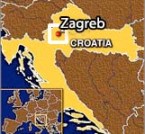New killing sends Croatia reeling
 Zagreb - Even as it hopes for an invitation to join the European Union, Croatia on Friday reeled in the wake of another high- profile murder and fears that organized crime has overpowered the state.
Zagreb - Even as it hopes for an invitation to join the European Union, Croatia on Friday reeled in the wake of another high- profile murder and fears that organized crime has overpowered the state.
Croatia's top security body met in an urgent session after a bomb killed journalist, editor and publisher Ivo Pukanic and the marketing director of his NCL Media Group, Niko Franic, on Thursday evening.
President Stjepan Mesic, Prime Minister Ivo Sanader and security ministers were joined by the leaders of all parliamentary parties at the meeting, reflecting the sense of urgency among the nation's leaders.
"Croatia will be a secure country," Sanader said after the meeting. However, he did not announce concrete measures against "terrorism, or organized crime, whatever you call it."
Mesic also spoke of "terrorism" in relation to the killing of Pukanic, 47, and Franic, 38.
Only 10 days before, State Prosecutor Mladen Bajic admitted in a confidential report - leaked by the weekly Globus - that authorities were losing the war against crime.
Before Pukanic's murder, the nation was already in shock after the mafia-style execution of Ivana Hodak, 28, the daughter of a prominent criminal lawyer, only 16 days before.
After that murder, Sanader sacked the interior and justice ministers and promised a crackdown on organized crime.
The Hodak killing was one of dozens in recent years that remains unsolved.
A nationwide protest against surging organized crime and the apparently helpless police was held after Hodak's death, with protesters displaying slogans such as "each country has a mafia, but in Croatia, the mafia has its country."
Police refused to speculate upon, "or rule out," any possible motives for Pukanic's murder.
Founder, majority owner and longtime editor of the weekly Nacional, he had links with figures on both sides of the law.
He and his reporters investigated sensitive, dangerous topics, including the pan-Balkan smuggling of cigarettes, weapons, drugs and human beings, all activities which are alleged to have ties to the government.
He won the journalist of the year award in 1999 for investigative reporting, but was also branded a mouthpiece for Mesic and the now- jailed king of the Croatian underworld, Hrvoje Petrac.
Some also doubted the credibility of Nacional's often anonymous sources.
The killings and beatings, on the rise in recent months, frighten Croats, who hope to win an EU accession date in 2009, 14 years after their war for independence from the former Yugoslavia ended.
The EU reacted to the killing, condemning it and expressing an expectation that the killers would be brought to justice.
"The European Commission strongly condemns the criminal attack which killed a journalist, Ivo Pukanic, and his paper's marketing director Niko Franjic," Enlargement Commissioner Olli Rehn said in a statement.
"We trust the Croatian authorities will duly investigate this attack and bring the perpetrators to justice," he said.
The South East Europe Media Organization (SEEMO), a regional organization of editors, media executives and leading journalists from South East Europe, also condemned the killing, calling it pressure on reporters.
"SEEMO views this bombing as one of the most serious attacks on press freedom in recent years, not just in Croatia, but in the entire South-East European region," it said.
A few months before Pukanic was killed, a reporter on organized crime, Dusan Miljus, was brutally beaten with baseball bats.
But the violence extends beyond attacks on journalists.
Between the Hodak and Pukanic murders, a real-estate developer was also executed.
The director of a state-run enterprise in charge of roads was also attacked with a baseball bat.
In the end, many analysts say the killings and attacks can be tied to the billions of dollars that organized crime across the former Yugoslavia wants to launder - the same topic about which Pukanic and Nacional often wrote. (dpa)